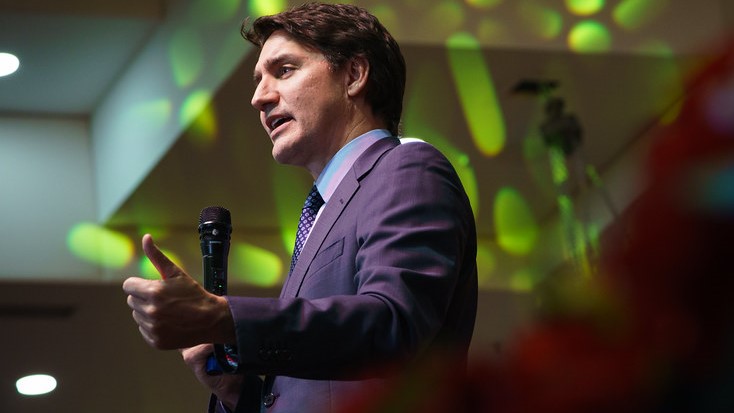Justin Trudeau’s resignation as Liberal Party leader and prime minister on Monday ushers in a new wave of uncertainty for the Canadian economy and financial markets.
Expect delays in business decisions, sluggish hiring and subdued investments in the immediate aftermath of Trudeau’s resignation. Businesses and foreign investors are likely to remain cautious as they await clarity on Canada’s leadership and economic policies.
Canada’s economic policy uncertainty has surged to the highest in decades, excluding May 2020 — the early days of the COVID-19 pandemic — and is significantly higher than that during the 2007-2008 global financial crisis.
Bloomberg’s Canada economic policy uncertainty index jumped to 650, a notable rise given that it has hovered between 200 and 350 in recent decades. The jump in uncertainty highlights the risk to the economic outlook caused by the political sector.
For nearly a decade, Canada’s political stability helped attract foreign investments. Trudeau’s resignation adds to the uncertainty in Canada’s economic environment, which could temporarily deter investments from flowing into Canada.
The Canadian dollar dropped to below $0.692 US last week, a new low, but briefly rose when Trudeau announced his departure.
The Bank of Canada’s rate cuts, combined with easing inflation, were expected to fuel economic growth by early 2025. This latest bout of political instability could postpone recovery as businesses could delay hiring and investments, adopting a wait-and-see approach.
The current uncertainty could weaken Canada’s bargaining position at a time of tariff threats from the U.S. Trudeau staying on as Donald Trump’s administration begins may help smooth out some of the uncertainty with Canada’s largest trading partner in the meantime.

The latest political upheaval
Trudeau will stay on as prime minister while the Liberal Party chooses a new leader. Once selected, the new leader would have limited time to prepare for a national campaign.
The next federal election is currently slated for no later than October and could be triggered sooner, but not while Parliament is prorogued until March 24.
While Trudeau resisted previous calls to step down, December’s political upheaval may have contributed to Monday’s announcement. Chrystia Freeland resigned as finance minister and deputy prime minister on Dec. 16, hours before the fall economic statement was introduced.
Freeland, in her resignation letter, discussed her disagreements with Trudeau over fiscal spending in anticipation of potential U.S. tariffs.
Her departure occurred as the federal government’s budget deficit reached $60 billion — a whopping $20 billion past its initial projection. Trudeau subsequently faced mounting pressure from within the Liberal caucus across Canada to resign.
This political volatility reflects broader economic challenges and dissatisfaction with incumbents worldwide, as high inflation following the COVID-19 pandemic continues to weigh on governments and factored into election losses by incumbent candidates globally.
Read more insights from RSM Canada in The Real Economy Canada. Click here to subscribe.

